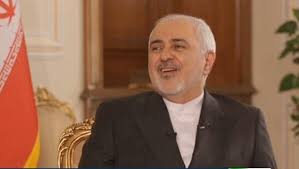February 28, 2020

Iran and the US exchanged angry letters during the recent confrontation that followed the killing of Maj. Gen. Qassem Soleymani and the two sides came “very close to the brink,” Iranian Foreign Minister Mohammad-Javad Zarif told NBC News.
Zarif said relations remained tense after the January showdown and he accused President Trump for pursuing a misguided policy toward Iran.
“It’s unfortunate that the United States, based on misinformation, based on ignorance and arrogance, combined on a course that has brought the region very close to the brink,” Zarif said. “We were very close to a war.”
Actually, many if not most serious analysts believe the two countries were never close to war because neither wanted a war.
In a separate interview, Zarif said Trump and American officials badly “miscalculated” because the killing prompted many Iraqis to go into the streets demanding the withdrawal of all US forces from Iraq. That is true. It happened one day in January when the cleric Muqtada as-Sadr ordered such a protest. However, much larger, longer and continuing demonstrations are demanding that Iran be cut off from influencing Iraq. Zarif didn’t mention that.
In his NBC interview, Zarif alleged that Secretary of State Mike Pompeo had written an “extremely inappropriate letter to Iran” at the height of the crisis in January and that his government responded with a strongly worded reply.
Pompeo’s letter contained “threats,” Zarif said, but he said he would not repeat what was written as it was beneath him. “Let him say what he put in that letter.”
Zarif said the response from the Iran’s Foreign Ministry was “not as impolite as his letter.”
Zarif, speaking on the sidelines of an annual security conference in Munich, acknowledged that the tone of communication between the two governments had deteriorated.
“It didn’t used to be this way,” Zarif said, citing negotiations during the Obama Administration in which he frequently spoke to then-Secretary of State John Kerry.
“I’m still the same foreign minister that dealt with John Kerry in a respectable way.”
Zarif blamed the US administration for triggering the crisis and said that it was up to Trump to pull back.
Asked about the risk of an inadvertent war, Zarif said, “Well, the United States hit at the wrong place, at the wrong time, and these are the consequences and we can’t control the consequences, nor can the United States. I mean, people are responsible for the consequences of their actions and I think people who initiated this need to walk back.”
Addressing Iran’s retaliation for the Soleymani assassination, Zarif said, “We wanted to show to the United States that they could not bully Iran. Actions against Iran will have repercussions, but the intention was not to kill anybody,” Zarif said. “The intention was to send a message, a very clear message to the United States, that if they kill Iranians, we will hit back.”
The Trump Administration said the strike against Soleymani was justified because an American contractor was killed in a rocket attack in northern Iraq that Washington blamed on an Iranian-backed militia.
Zarif denied that Iran had control over Shiite militias in Iraq or the Hezbollah militia in Lebanon.
Soleymani was working at “containing people from engaging in actual military operations against anybody,” Zarif said. “This was his job. This was what he was trying to do, to contain the situation.”